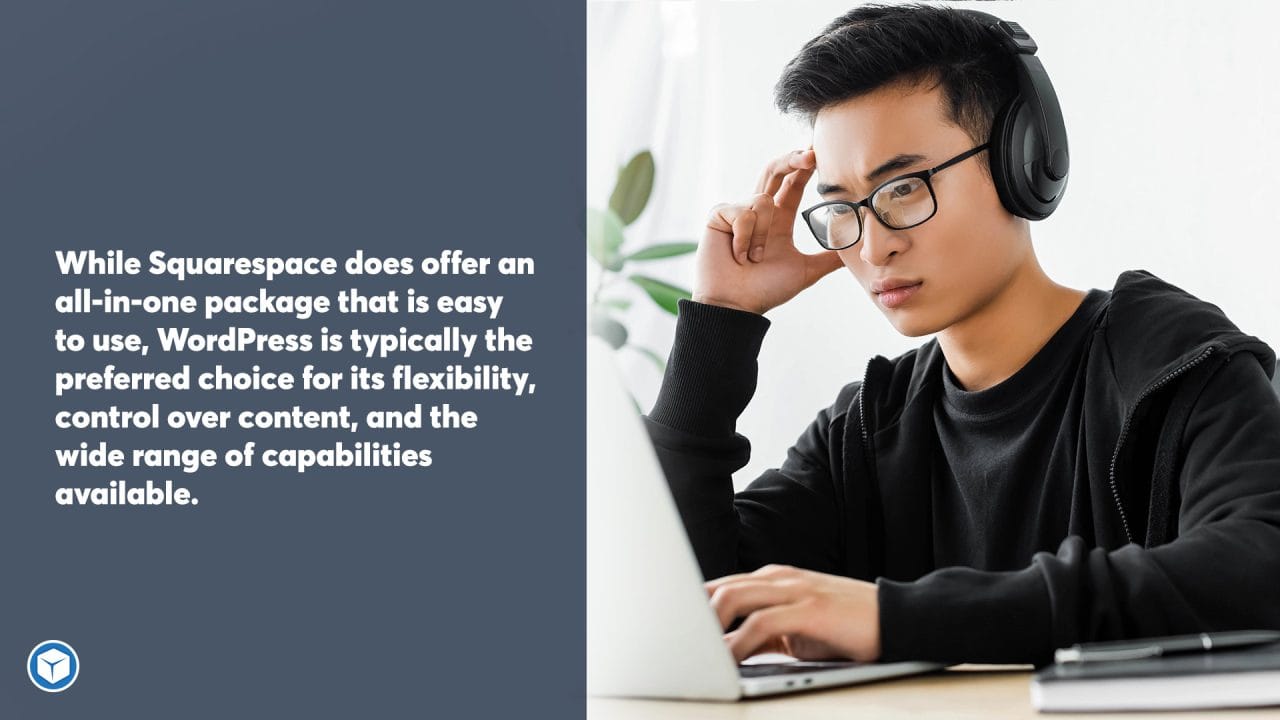
When comparing Squarespace and WordPress, one of the most common questions we get asked is, “Is Squarespace better than WordPress?”
In a nutshell, WordPress offers more flexibility, customisation options, and access to advanced features that Squarespace lacks, making WordPress the superior choice for business owners.
So no, Squarespace is not better than WordPress, and we’ll explain why in this article…
Key Takeaways
- WordPress offers greater customisation and flexibility than Squarespace, making it the superior choice for business owners.
- Squarespace provides an accessible platform, but WordPress excels in scalability and extensive customisation options.
- Considering cost, content management, and e-commerce potential, WordPress emerges as the better solution over Squarespace for businesses.
Table of Contents
While both WordPress and Squarespace offer robust solutions for creating and managing websites, they serve different needs and audiences. Unlike WordPress, Squarespace is often lauded for its simplicity and design-focused approach, positioning it as a suitable choice for those seeking a more straightforward platform with less technical requirements and no coding knowledge requires. On the other hand, a WordPress site stands out as the more powerful and versatile option, especially for business owners who require a scalable and customisable online presence.
Tailored to the needs of a broad user base, WordPress provides extensive customisation compared to other website builders through themes and premium plugins, allowing for unique and functional websites that can grow with a business. It also presents a cost-effective model with its open-source nature, which can be more appealing to those with budget considerations. While Squarespace does offer an all-in-one package that is easy to use, WordPress is typically the preferred choice for its flexibility, control over content, and the wide range of capabilities available, particularly for users looking to optimise their site for search engines, expand their ecommerce functionality, or maintain a dynamic blog.

Squarespace vs WordPress – Target Audience and Suitability
When choosing a content management system, the target audience and suitability of the platform are paramount. WordPress is particularly versatile, initially serving as a blogging platform and now offering full content management capabilities. It is a strong choice for a broad spectrum of users, from bloggers and freelancers to small business owners and even large corporations seeking a robust online presence. WordPress challenges users with a more hands-on approach, requiring the selection of a web hosting account and managing the intricacies of site construction, which offers a level of flexibility and a wide array of customisation options through WordPress themes and plugins.
On the contrary, Squarespace appeals to those preferring simplicity and ease over extensive customisation. It’s an all-inclusive platform suitable for beginners, or individuals who desire a professional-looking website without the need to understand coding or web design. Squarespace’s service package is a one-stop-shop, including hosting, a domain, and support, which may be especially attractive to small business websites wishing to streamline their setup process.
The community support and user base of each platform differ significantly. WordPress boasts a vast community that contributes plugins, themes, and wisdom, which can be immensely beneficial for troubleshooting or enhancing one’s website. Squarespace’s community is smaller, and while it offers quality support, the options for third-party enhancements and peer support are more limited in comparison.
In essence, building a WordPress website is the superior choice for business owners due to its scalability, extensive customisation options, and strong community support. Squarespace can be the right match for users preferring a more curated and novice-friendly approach, limiting the complexity inherent in website management. Both platforms serve their target audiences well; however, WordPress presents a richer environment for growth and adaptability, which is vital for businesses expanding their online footprint.
Squarespace vs WordPress – Pricing: Understanding Costs and Value
When considering Squarespace and WordPress costs for building and hosting a website, understanding their pricing structures is fundamental to making an informed decision.
Squarespace pricing offers an all-in-one solution, with its pricing plans typically including premium templates and hosting. The service doesn’t offer a free plan, and prices start from around AUD 16 per month. One of the key advantages here is that a free domain (free custom domain) is included for the first year on most plans. However, the cost may rise with the need for additional features or e-commerce capabilities.
In contrast, WordPress offers a more flexible approach to pricing. Users can start with a free plan, which may suffice for basic sites, but the costs can increase with the need for additional functionality. This increment in cost is attributed to the necessity for premium plugins, custom domain registration, and web hosting, all of which are typically not inclusive of the free package. WordPress allows for a varied range of web hosting options, enabling businesses to scale their hosting based on site traffic and complexity.
Domain registration costs are another consideration. While a Squarespace plan tends to include this in their package, WordPress relies on users purchasing a domain separately, which can range from AUD 15 to AUD 50 per year. Additionally, WordPress users have the flexibility to choose a web hosting provider that best suits their budget and performance requirements.
Comparing both platforms:
- WordPress Account: Free plan available; additional costs for plugins, hosting, and domain
- Squarespace Account: No free plan; upfront costs include hosting and domain (first year)
When it comes to value for money and long-term scalability, WordPress presents a more robust solution for business owners who anticipate growth and require flexibility in managing their online presence. Users are advised to remain vigilant for potential hidden costs such as premium designs and plugin renewals. This transparency in cost structure makes WordPress a compelling choice for those who seek a scalable and cost-effective platform for their business needs.
Squarespace vs WordPress Theme – Design and Customisation: Themes, Plugins and Builders
When comparing WordPress themes and plugins with Squarespace templates and builder tools, it’s clear that WordPress offers a broader spectrum of customisation options. WordPress users can choose from thousands of premium themes, each allowing for intricate modifications that can cater to the most niche business needs. These themes are complemented by a vast array of WordPress plugins, including ecommerce plugins, which enhance functionality and allow for further personalisation.
Squarespace, while providing an intuitive website builder experience, has a more limited selection of Squarespace templates. These templates are well-designed and suitable for users seeking a more streamlined, cohesive look without the need for extensive customisation. Squarespace’s design approach focuses on simplicity and ease of use, which is fitting for individuals or small businesses that desire a polished aesthetic with minimal effort.
In terms of flexibility and ease of design customisation, WordPress stands out as the more adaptable solution. Not only does it cater to a broader range of design preferences through its WordPress themes, but it also allows businesses to scale and extend their websites through plugins. On the other hand, Squarespace’s streamlined approach reduces complexity but also limits the degree of customisation.
For business owners, the ability to adapt and personalise their website is often paramount. With its extensive ecosystem of WordPress plugins and themes, WordPress provides a robust platform that can grow with the business. It allows for intricate tailoring of the online presence, making it the preferred choice for those prioritising flexibility and scalability in their website design and functionality.

Squarespace vs WordPress Website – User Experience: Learning Curve, Accessibility and Dashboard Management
For business owners deliberating between Squarespace and WordPress for their digital presence, the choice hinges on the user experience, specifically the learning curve, accessibility, and dashboard management.
The Squarespace dashboard is intuitively crafted to cater to beginners, offering a streamlined interface where users can effortlessly add and manipulate content through a drag-and-drop system. There’s no requirement to understand coding, which reduces the initial hurdle for new users. The platform’s management tools are neatly integrated, allowing users to maintain their site with minimal technical know-how.
In contrast, though it is easy to install WordPress it does present a steeper learning curve, demanding a more profound understanding of its content management system and possibly, some knowledge of coding to write custom CSS to maximise the site’s potential. The WordPress dashboard is extensive, offering a high degree of customisation that can seem daunting at first. However, it rewards users with a vast array of powerful options once mastered.
WordPress users typically have more customisation needs and are willing to navigate a more complex interface, which provides a richer set of tools to manage their website effectively. Although this may require more time and dedication initially, the potential for a tailored, feature-rich site is significant.
Factor Squarespace WordPress Learning Curve Suitable for beginners Suited for users with technical skills or resources Accessibility High – easy navigation Variable – depends on user’s technical ability Dashboard Management Simplified and user-friendly Complex but highly customisable
Ultimately, while both platforms aim to simplify web design, WordPress affords a scalable experience not confined by the boundaries of built-in functionalities, making it an ideal choice for businesses seeking a comprehensive digital solution. The initial investment in learning how to utilise WordPress effectively can result in a more robust and customised online presence.
Squarespace vs WordPress – E-commerce Capabilities: WooCommerce vs Squarespace Commerce
When deciding between Squarespace and WordPress for online stores, business owners should consider their needs in terms of functionality and scalability.
WooCommerce, the e-commerce plugin for WordPress, stands out for its extensive customisation options. It allows the selling of unlimited products, ranging from physical items to digital downloads and services. Businesses can control every aspect of their online store, with the freedom to integrate numerous add-ons for enhanced capabilities. This can be notably advantageous for businesses looking to scale or those with specific requirements for their online operations.
Squarespace Commerce, while offering an all-in-one platform, has its limitations. E-commerce functionality within Squarespace is built-in, which ensures a seamless experience for store setup. However, the customisation options are not as extensive as WooCommerce. This can imply a more straightforward setup process but might restrict businesses when they aim to expand or tailor their e-commerce experiences.
Feature WooCommerce (WordPress) Squarespace Commerce Product Limit Unlimited Limited by plan Customisation Extensive; full code access Some customisation Integrations Wide range of plugins In-house integrations Control Full ownership of data More controlled by platform
While Squarespace can be an excellent choice for small businesses seeking simplicity and speed in store setup, WooCommerce provides a robust platform for long-term growth and customisation. This level of control and versatility is why many consider WordPress with WooCommerce to be a superior option for business owners looking to establish a strong online presence.
Squarespace vs WordPress – SEO and Online Visibility
When comparing Squarespace and WordPress for Search Engine Optimisation (SEO), one must consider the tools and features each platform offers to enhance a website’s visibility on search engines. SEO is the practice of optimising a website to rank higher in search engine results, thereby increasing the organic reach to potential customers.
Squarespace provides users with a set of built-in SEO features such as meta titles, descriptions, and custom URLs. It also offers seamless Google Analytics integration across all plans and enables simple social media linkage. However, it limits users to the platform’s own tools without the option to add third-party SEO applications.
On the other hand, WordPress extends its basic SEO capabilities by supporting a vast range of third-party SEO plugins and tools. For instance, plugins like Yoast SEO enable users to undertake advanced SEO analysis and fine-tune their content for better performance in search results. WordPress generates XML sitemaps automatically, enhancing the visibility of content to search engines.
Additionally, WordPress becomes more potent in its SEO capabilities at the Business tier, where users gain access to Google Analytics and can utilise diverse SEO plugins, providing more nuanced control over website optimisation strategies.
Tools for SEO Enhancement:
- Squarespace: Built-in SEO features, Google Analytics, and social media integration.
- WordPress: Advanced SEO plugins (e.g., Yoast SEO), Google Analytics at Business tier, auto-generated XML sitemaps, and capability for more custom SEO strategies.
In the SEO context, the flexibility and extensiveness of WordPress, with its capacity for adding numerous SEO tools and plugins, generally place it ahead of Squarespace. This makes WordPress a more robust choice for business owners seeking to maximise their SEO efforts and online visibility.
Move your existing website to a better platform – where you remain in control.
Ready to level up your online presence? Our tailored WordPress migration service can make it happen. Contact us to start your migration project.

Squarespace vs WordPress – Blogging and Content Management
When evaluating Squarespace and WordPress for their blogging capabilities and their efficacy as content management systems (CMS), they reveal distinct features and functionalities. WordPress, as a CMS, provides a myriad of blogging tools and customisation options. Its open-source nature allows for extensive flexibility, with access to a wide array of blogging templates and plugins like Yoast SEO, which aids in optimising content for search engines.
In contrast, Squarespace offers a more contained environment with built-in blogging tools, appealing to those wanting a simple and quick setup. However, Squarespace maintains less flexibility compared to WordPress, with limited third-party integrations. Squarespace’s interface facilitates easy content creation and management with its drag-and-drop editor, making it user-friendly for beginners.
While Squarespace’s streamlined approach suits individuals with minimal technical expertise, WordPress is by far the superior choice for business owners who seek a robust blogging platform that they can tailor to a professional level. The depth of WordPress’s content management features, from its comprehensive library of plugins to the diverse range of customisable blogging templates, positions it as the more advantageous platform for business owners aiming to scale their online presence.
Users of WordPress can wield the power of plugins like Yoast SEO for advanced content strategies, ensuring they stay ahead in the competitive world of search engine rankings. WordPress’s adaptability places it as the leading content management system, suitable for a diverse range of applications, from simple blogs to intricate websites for large-scale businesses. With WordPress, they gain the ability to expand and adapt their blogging strategies over time, a key factor in long-term digital marketing success.
Squarespace vs WordPress – Mobile Editing and On-the-Go Management
When considering mobile responsiveness and editing capabilities for website management, Squarespace and WordPress cater to different user needs. Squarespace boasts a user-friendly mobile editing experience. Their mobile app allows users to make significant design changes. This includes editing the layout and content, which aligns with the platform’s reputation for intuitive use. However, Squarespace’s mobile responsiveness can hinge heavily on the chosen template.
On the other hand, WordPress offers a robust solution for on-the-go website management. While the native app may not provide the full extent of desktop customisation options, it compensates with the flexibility offered by numerous plugins. These plugins enhance mobile responsiveness and provide additional editing capabilities.
For business owners, WordPress is often the preferred choice. This is due to its scalability and the vast ecosystem of WordPress plugins that can tailor mobile experiences and improve website management through mobile devices. The ability to choose from thousands of themes and plugins means WordPress can be optimised for virtually any mobile user requirement, which is a critical factor for businesses looking to maintain a competitive online presence.
In summary, while both platforms provide mobile editing, WordPress stands out for its extensive customisation options. These options are essential for businesses that require detailed modifications and want to ensure optimal mobile user experiences. WordPress’s flexibility through plugins positions it as a more adaptable platform for mobile management compared to Squarespace.
Squarespace vs WordPress – Ongoing Maintenance and Updates
When comparing Squarespace with WordPress, one needs to examine the maintenance and update requirements closely.
Squarespace provides a fully managed solution. They handle maintenance and updates centrally, causing minimal disruption to the user. There’s no need for business owners to worry about updating software, plugins, or security patches — Squarespace does it all. However, the trade-off is less control over the timing and features of updates.
WordPress, on the other hand, is an open-source platform that empowers users with more autonomy. This means that website functionality can be extensively customised through themes and third-party plugins. However, these add-ons require regular updates to stay secure and function smoothly. WordPress core updates are frequent and users must take an active role in applying these to ensure their website remains operational and secure.
- WordPress Updates: Users need to manually update their websites, although some hosting providers offer automatic updates for the WordPress core.
- Third-party Plugins: These plugins can add powerful functionality but must be updated by the user to avoid security vulnerabilities or compatibility issues.
- Maintenance Workload: The utilisation of more plugins often results in increased maintenance work.
The flexibility of WordPress makes it a preferred choice for business owners who are looking for a platform that can grow and adapt to their changing needs. However, this does come with greater responsibility for website maintenance. Users must stay proactive with updates to ensure the site’s long-term health and functionality. In contrast, Squarespace’s hands-off approach is more straightforward but can limit a site’s flexibility and potential for customisation.

Squarespace vs WordPress Comparison – Security Measures and Data Protection
When evaluating the security measures of Squarespace and WordPress, one must consider the differences inherent in the management of each platform’s security. Squarespace is a managed service, meaning the company inherently takes on the responsibility for securing web hosting accounts and the overall platform. In contrast, WordPress offers a more hands-on approach which requires the site owner to be proactive about security.
Squarespace’s Security Features:
- Automated: With Squarespace, security updates are automatic and managed by the service itself, ensuring Squarespace accounts and their data are protected against the latest threats without user intervention.
- Secure by design: Squarespace provides a secure server environment and includes an SSL certificate for every site, important for protecting sensitive data in transit.
WordPress Security:
- Customisable: WordPress allows for numerous security plugins and custom configurations, empowering businesses with specific security needs to tailor their site’s defences.
- User Responsibility: The security of a WordPress site significantly depends on the user’s actions, such as keeping the WordPress core, WordPress theme, and plugins up to date.
Both platforms take data protection seriously, but the user’s role in each is different. Squarespace users rely on the platform for security, whilst WordPress users are expected to take action to secure their own sites. The latter may seem daunting, but it allows for more control and potentially stronger data protection tailored to the business’s specific needs.
For businesses with the resources and know-how to manage security actively, WordPress can provide robust protection. This self-management model of WordPress often suits business owners who prefer a hands-on approach and assume a greater role in data protection practices.
Squarespace Site vs WordPress Site – Content Ownership and Portability
When considering Squarespace versus WordPress, a pivotal aspect for site owners to examine is content ownership and portability. WordPress operates on an open-source model, which grants its community unrestricted access and control over all content. In contrast, Squarespace, while user-friendly, maintains more stringent control over site content due to its proprietary platform. This pivotal difference affects how users manage and migrate their Squarespace website.
For Squarespace users, the process of content transfer can be challenging. The platform allows basic content exportation, such as pages, galleries, and one blog page with all posts. However, certain elements, like product pages, audio, and video, do not transfer easily. In the event of a migration, owners may encounter limitations, potentially leading to a loss of content, requiring manual transfer or even recreation on the new platform.
In the WordPress community, users benefit from a vast array of tools specifically designed for content migration. The versatility of WordPress enables site owners to export their entire website content, including custom code, with ease. WordPress’s exportability is a significant advantage for business owners who prioritise future flexibility and control over their online presence.
For businesses that foresee growth and changes, WordPress provides the ease of site migration and data portability necessary for long-term digital strategy. The clear distinction in how each platform handles content ownership and data transfer indicates that, for full control and freedom over their site, WordPress is the favourable choice for serious site owners.
Is Squarespace Better Than WordPress? – Final Thoughts
When weighing up whether Squarespace or WordPress is the superior option, especially for small business owners, various factors come into play. Understanding the needs and capabilities of a business is crucial in making an informed decision.
Ease of Use: Squarespace is known for its user-friendly interface, offering drag-and-drop technology and a selection of customisable templates. For individuals seeking simplicity and minimal maintenance, this might appear to be an attractive solution.
Customisation and Control: WordPress, on the other hand, provides expansive customisation options. With thousands of themes and plugins, one has the flexibility to craft a distinct online presence. Small business owners in particular benefit from WordPress due to its scalability and robust content management capabilities.
Templates and Design: Though Squarespace is celebrated for its sleek templates, WordPress’s extensive range of themes caters to more diverse needs and personal preferences.
For an individual starting out or handling straightforward projects, Squarespace may fulfil their criteria adequately. However, when assessing the platforms through the lens of a small business owner, WordPress emerges as the better choice. It provides the tools needed to construct a comprehensive, growth-driven website, with more room for customisation and scalability. Therefore, for businesses planning to expand, modify their online strategy, or simply require a higher degree of functionality, WordPress should be the platform of choice.
At Chillybin we prefer WordPress as a website platform, and we no longer work on any other website builders. For us – WordPress wins!
To get started building your WordPress site, or to migrate your business from another platform to a newly designed WordPress site, contact our team today.




